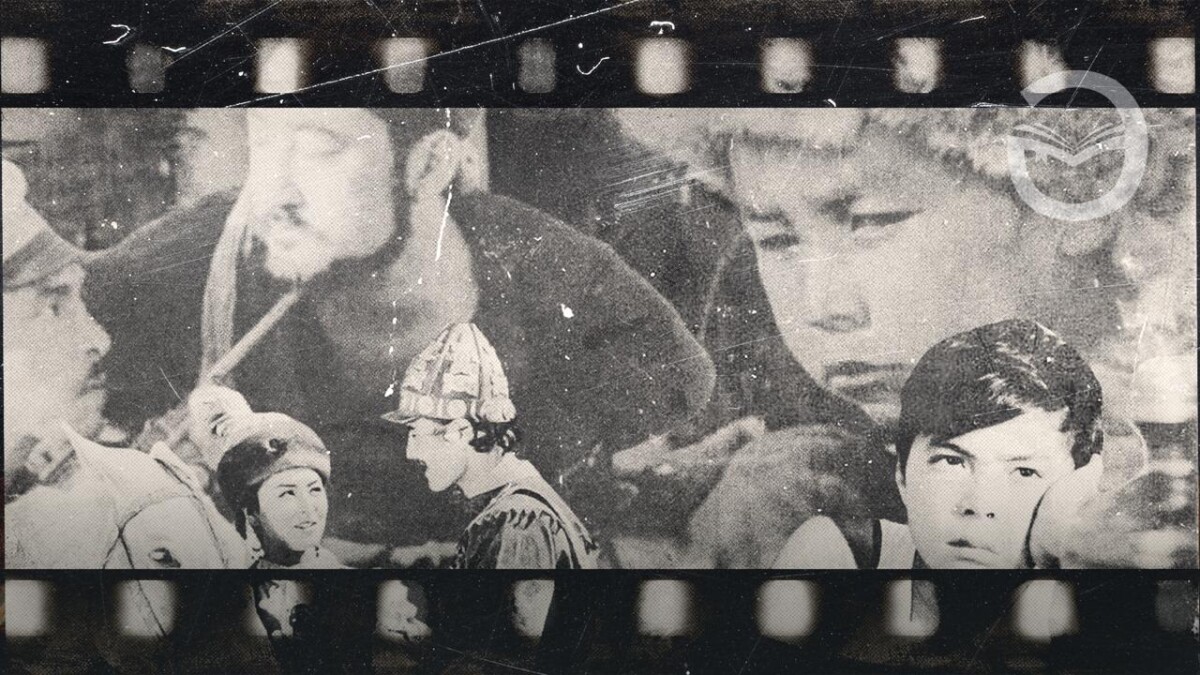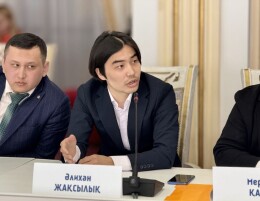Regardless of the country, cinema has historically been closely intertwined with folk art and literature during its inception and evolution. In the annals of Kazakh cinema, various forms of literary adaptation abound. While some of these endeavors have met with success, others have fallen short of capturing the essence of the original works. The adaptation of literary works is one of the most intricate, responsible, and pressing issues within the film industry. While some directors strive to preserve the essence of the literary original without significant alterations, others transpose the setting, characters, and plot to different countries or eras. Consequently, new characters may emerge, and storylines may evolve.
Mikhail Romm, a luminary of Soviet cinema, once remarked, "...In mastering the art of Cinema, we must first and foremost glean insights from literature itself. Literature is the progenitor of cinema...". Similarly, in his treatise "Literature and Cinema," Mukhtar Auezov underscores the intrinsic connection, harmony, and uniqueness shared between literature and cinema. He eloquently elucidated and extolled the profound influence of literature on the evolution of cinema as an art form. Nevertheless, as cinematography progressed and filmmakers honed their craft, cinema began to exert its own influence on literature. For instance, the kinetic energy of films, characterized by seamless scene transitions, profoundly impacted literary narrative techniques. Inspired by cinema, writers gradually adopted a style wherein dual storylines unfold concurrently within a single chapter, paragraph, or even sentence.
In subsequent years, young Kazakh filmmakers have increasingly turned their attention to literary works, albeit infrequently. Director Elzat Eskendir adapted Oralkhan Bokey's tale, "Oliara," and Erbolat Abikenovich's "Looking for an Apartment." More recently, director Zhanabek Zhetiruov concluded filming "Shynyrau," based on Abish Kekilbayev's story. Likewise, Darezhan Omirbaev crafted "About Love," drawing inspiration from the tales of A. Chekhov, and "Shuga" and "Student," inspired by the novels of L. Tolstoy and F. Dostoevsky, respectively.
Undoubtedly, Kazakh cinema boasts numerous adaptations of literary works throughout its history. Yet, as previously noted, not all adaptations have garnered acclaim. Nonetheless, there exist works that shine brightly in both literary and cinematic realms. Let's explore a few of them.
My Name is Kozha (1963)
The film "My Name is Kozha" stands as a classic of Kazakh cinema and marks the first endeavor in Kazakh children's cinema. Directed by Abdullah Karsakbayev in 1963, the plot of the film is adapted from the literary work "My Name is Kozha," a renowned novella by Berdibek Sokpakbayev. The director's choice of this particular work was influenced by its genuine humor, optimism, and engaging storyline. Nisson Zeleranskiy, the screenwriter, adeptly crafted a script that complemented the film's essence. Mikhail Aranyshyev served as the cinematographer, capturing scenes with finesse, while the renowned composer Nurgisa Tlendiyev composed special scores for the film. It was the artistic touch of production designer Kulakhmet Kojykov that brought the eighty-six-minute film to life, depicting post-war rural life vividly. The film was shot in the vicinity of Ushkonyr, Talgar, Turgens, and Lake Big Almaty.
Premiering on May 19, 1964, in Moscow, the film recounts the adventures of a twelve-year-old Kazakh boy named Kozha. Curious and imaginative, Kozha embarks on various escapades, often finding himself in amusing and awkward situations due to his honesty and straightforwardness. Despite his mischievous nature, he is not foolish and resolves to change to avoid disappointing his mother and grandmother or causing harm to others. Although Kozha distrusts his class teacher, Sabira Maykanova, he believes Mr. Rahmanov will support him unconditionally.
One of the greatest challenges in scriptwriting, as assigned and finalized by the director, was casting the lead child actor. Despite having selected many actors for the film, none passed the audition for the role of the protagonist, Kozhabergen Kadyrov. Officials, who had finally begun supporting the film industry, grew impatient with the delays in shooting and even considered withdrawing support from the project. Abdullah Karsakbayev and his team intensified their search for the lead across schools in the city and surrounding villages. Fortune smiled upon them when, during a lunch break with colleagues at the intersection of Komsomolskaya and 8th March streets, School 33 caught their attention. They spotted a boy in tattered clothes, engaging in a scuffle with his peers. Karsakbayev immediately recognized Nurlan Segizbayev (later Nurlan Sanzhar) as the adolescent who would portray the main character.
In addition to Nurlan, the artistic ensemble included actors such as Marat Kokenov, Gulnar Kurabayeva, E. Kurmashev, Biken Rimova, Kenenbay Kozhabekov, Raisa Mukhamedyarova, Zagi Kurmanbayeva, Makil Kulanbayev, Baydald Kaltayev, Akhat Tolubaev, and Kalken Adilshinov. Students from Abay School in Kaskelen also participated in mass scenes.
From its release, this children's comedy captivated both young and adult audiences. Kazakh cinema gained international recognition, earning a commendation at the International Film Festival for Youth and Children in Cannes, France, in 1967.
The film "My Name is Kozha" was fully dubbed in English for screening at the Romford Film Festival in London in 2019 as a Central Asian film, marking a historic milestone. Children from drama clubs in American schools were invited to provide the dubbing.
Kyz-Zhibek (1972)
Sultanakhmet Kozhykov filmed his most renowned work at the "Kazakhfilm" studio in 1969-1970. The premiere of the film took place on September 18, 1972, presenting a cinematic adaptation of the famous lyrical-epic poem "Kyz-Zhibek." The screenplay for this two-part drama was penned by writer Gabit Musrepov, while the esteemed composer Nurgisa Tlendiyev embellished the film with his picturesque melodies.
The film narrates a tale from the distant past of the Kazakh people, set in the 16th and 17th centuries, a time marked by inter-tribal wars and conflicts. Each Horde vies to elevate its Khan above others.
The storyline revolves around the love story of the courageous warrior Tolegen and the beautiful maiden Zhibek from the Zhebayly-zhetiru clan (Small Horde). Against the wishes of his father, Tolegen, a young, intelligent, and resourceful man, chooses Zhibek, the daughter of the clan leader Sirlibai, from a neighboring tribe. However, malicious forces hinder the love between the young heroes. Their union prevents a rift between feudal orders and clans. Zhibek dies at the hands of the second protagonist, Bekezhan, who is infatuated with silk, and her spirit ascends to the bright waters of the Urals.
The lead role in the film was portrayed by Meruert Utekesheva, who was seventeen at the time. She reflected on her experience in the film: “I was fortunate to work under Uncle Sultan's guidance. I still remember how he worked with us. Senior Sultan was a great mentor to me. During rehearsals, there was little talk; we understood immediately what was needed and how to perform, without even making eye contact.”
Furthermore, the film featured prominent Kazakh cinema stars such as Kuman Tastanbekov, Asanali Ashimov, Anuarbek Moldabekov, Kenenbay Kozhabekov, Gulfairus Ismailova, Farida Sharipova, Idris Nogaybayev, Kauken Kenzhetayev, and Sabira Maykanova.
The film resonated with audiences and garnered positive reviews from critics. It received the award for Best Artistic Design (Gulfairus Ismailova) at the International Film Festival in Tbilisi in 1972. Additionally, director S. Kozhykov and actor K. Kozhabekov were honored with the State Prize of the Kazakh SSR.
Gauhartas (1974)
“Gauhartas” is a feature film produced by the Kazakhfilm studio in 1975. Its all-Union presentation took place in Moscow in 1977. The script was adapted from Dulat Isabekov's story of the same name. Askhat Ashrapov served as the film's cameraman, and Anatoly Bychkov composed its music. The film has a runtime of 83 minutes and was primarily filmed in Russian but dubbed in Kazakh. The main characters include Zhanna Kuanysheva (Saltanat), Anuar Boranbaev (Tas), Sapargali Dzhakishev (Kairken), Amina Umirzakova (Tastan’s mother), Kәuken Kenzhetaev (Tastan’s father), Doskhan Zholzhaksynov (Askerbek), Gulziya Belbaeva (Raushan), and Aisha (Lydia Ashrapova).
In 1975, while serving as a young soldier, Dulat Isabekov was moved by the beautiful song “Gauhartas,” igniting his nostalgia for his homeland. This sentiment eventually inspired him to write a new work, which served as the basis for the film's plot.
According to the plot of the film, Saltanat becomes the bride of a new family. Love, songs and laughter penetrate into the yurt of an elderly shepherd and his daughter-in-law. The single-family life of the family begins to change in the eyes of the viewer. And the husband’s younger brother Kairken, and the mother-in-law and father-in-law are so glad that the ceremony took place. Only Tastag, who speaks little, looks at his young wife as something necessary and simple. He misunderstands the shepherds of the integrated brigade and their advanced tasks, and works alone. He doesn’t even notice that his habits of building houses and managing them do not correspond to the flow of time. And others suffer from his cruelty and brutality. It's only when Saltanat falls seriously ill that he realizes his mistakes and the suffering he has caused.
Throughout the film, songs such as “Gauһartas” and “Saltanat Ani” are performed by singer Sazhida Akhmetova. Director Sharip Beisembayev held a rigorous casting process to find the perfect actress to portray the bride, ultimately selecting tenth-grader Zhanna Kuanysheva, who conveyed the Kazakh daughter-in-law's character with authenticity. Similarly, the search for the actor to play Tastan was challenging until Anuar Boranbaev arrived on set and captured the director's vision for the role.
In 1976, at the IX All-Union Film Festival in Kyrgyzstan, Zhanna Kuanysheva received the second-degree prize for her outstanding portrayal of the female lead in the film.
Love Station (1993)
The renowned melodrama by Talgat Temenov, based on his own story "Gulnaz," graced the big screen in 1993, with Leila Akynzhanova aiding in its cinematic adaptation. The plot revolves around a poignant love triangle involving Gulnaz, a high school student, and her two classmates, Ural and Zhenis.
Set in the 1980s in the remote Kazakh SSR outpost named "Love," the film introduces Gulnaz (portrayed by Bayan Alaguzova), who arrives to complete her final year of high school with her brother. There, she encounters Ural, an orphan living with his grandfather, and a bond begins to form. However, their teacher assigns Gulnaz to sit with Zhenis, sparking a rivalry that evolves into a classic love triangle.
Tensions escalate, leading to a confrontation between Ural and Zhenis after a school event, culminating in a harrowing shooting incident. Miraculously, Zhenis survives, opting to forgive Ural, who pledges to step aside. Despite his efforts to explain his feelings to Gulnaz before departing, misunderstandings arise, manipulated by Zhenis.
After some time, Ural, who works in Almaty, sees Zhenis on the street, he announces that he is marrying Gulnaz and invites her to the wedding. Ural and Gulnaz see each other at the wedding, understand each other internally, but it was already too late. A few years later, Ural goes by train to his home station of love. In the car he meets a little girl and during the conversation he learns that his mother has separated from his father. When the train stops at the station, the girl walks hand in hand with her mother, who turns out to be Gulnaz. The film ends with Ural and Gulnaz standing on a departing train and looking at each other for a long time.
The film's main roles were masterfully portrayed by Bayan Alagozova, Kubanichbek Adylov, and Bopesh Zhandaev, embedding itself in the hearts of viewers as a timeless love storyy.
Farawell, Gulsary (2008)
In the subsequent years, Kazakh directors didn't limit themselves to domestic literature but paid special attention to adapting foreign literary works for the screen. An example of this is the film of the same name produced in 2008, based on the work of Kyrgyz writer Chingiz Aitmatov, "Farewell, Gulsary." The adaptation of the renowned writer's dramatic work was carried out by screenwriters Erlan Nurmuhametov and Erzhan Rustembekov. The film's music was composed by the reliable collaborator of the director, Kuat Shildebayev.
The film was set in Soviet Kazakhstan in the 1950s. It portrays the entire drama of the Soviet era experienced by the communist collective farm worker Tanabay through his relationship with Gulsary, a purebred horse with whom he traveled his whole life.
The production of the 102-minute film took over a year, with filming taking place in the foothills near the village of Uzynagash in the Almaty region. Shooting began in February 2006 and lasted for three and a half months, but due to slow financing, the film was only completed in time for the start of the 5th Eurasian Film Festival in Astana from September 7 to 13, 2008.
Kyrgyz actor Dogdurbek Kydyraliev, who portrayed the main character Tanabay, spent three years preparing for this role and lost 13 kilograms. The horse Gulsary was played by a stallion named Harpoon from one of the stud farms in Taraz. Additionally, such artists as Raikhan Aitkozhanova, Zhanel Makazhanova, Nurlan Segizbayev, Erbolat Ospankulov, Yesbolgan Uteulinov, Bolat Abdilmanov, and Igor Seyfullin showcased their skills in the film.
The film won the Grand Prix of the Eurasia-2008 International Film Festival in Astana. Raikhan Aitkozhanova, who played the main female role, received a nomination for "Best Actress" at the independent Union of Cinematographers of Kazakhstan award "Kulager-2008," as well as awards for "Best Director" (Ardak Amirkulov) and "Best Actor" (Dogdurbek Kydyraliev) at the 2008 international film project in Issyk-Kul, 18th place in 2010 in Cottbus, Germany. It also received the "Audience Sympathy Award" at the Eastern European Film Festival and, in the same year, a special prize from the jury of the XVI Russian Film Festival "Literature and Cinema" in Gatchina, along with numerous other awards from international competitions. The film was produced by the Sh. Aimanov Kazakhfilm Studio and the Ardfilm film company.












